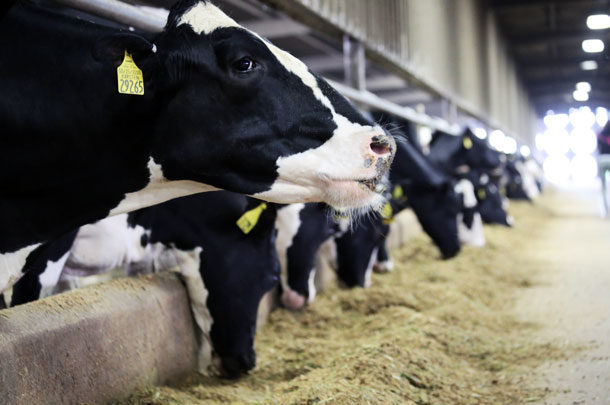Energy supply is an important reason why fatty acids or fats are fed, says Dr. Adam Lock, associate professor, Michigan State University.
Fats in the diet can also increase milk yield and components, help combat heat stress and improve reproductive efficiency.
Fatty acids come into the diet from nearly every feed source; however, they are not all created equal.
If the aim is to add supplemental fat, Lock suggests knowing the fatty acid profile to predict the cows’ response.
The effects of supplementation vary greatly depending on the fat supplement. It should be noted fatty acids could have negative effects, particularly on rumen function and digestibility. Sometimes the basal ration can also influence how a cow will respond to supplemental fats.
Lock and Jacquelyn Boerman, also from Michigan State University, conducted a meta-analysis to see how various types of fat supplements performed.
In all of the studies, the fat supplement was less than 3 percent of the ration dry matter content. The three different types of fat supplements included PFAD (calcium salts of palm fatty acid distillate), prills (saturated fat prills) and tallow (animal fat labeled as tallow).
The PFAD and tallow reduced dry matter intake by about 1 pound per day. Prills had no effect on feed intake, Lock says.
Across the board, the fat supplements increased milk yield by 2 pounds per day and milk fat yields slightly by 0.09 pounds per day. Milk protein yields slightly increased, particularly with the use of prills and tallow.
Overall fat supplementation increased milk yields and milk components, and reduced dry matter intake. However, the type of fat did influence the response.
In another study where 2 percent of the diet dry matter consisted of either C16:0 supplementation or C18:0 supplementation, the cows fed C16:0 increased milk yield by nearly 2 pounds per day, milk fat by 0.2 pounds per day and feed efficiency, independent of the cows’ level of milk production.
The C18:0 supplemented cows increased their dry matter intake, but there was no effect on milk yield or components, although higher-yielding cows did respond more positively.
Lock says feeding at 2 percent dry matter is high, so a study was conducted to test feeding rates at .75 percent, 1.5 percent and 2.25 percent. Maximum yields were noticed at 1.5 percent of ration dry matter.
In a field study on Michigan farms, 2 percent added fat-replaced soy hulls in the ration. Increases were noticed in milk yield, fat and protein. Energy-corrected milk was up 7 pounds, compared with the control group.
Overall, Lock reports some benefits to fat supplementation in the ration, but cautions that not all fat sources are the same. The key is knowing the fatty acid in the supplement you plan to use.
C16:0 has shown the potential to increase yields of milk and milk fat as well as the conversion of feed to milk, independent of production level. However, Lock says more research is needed to clearly establish the effects of fat supplements. PD
PHOTO: Adding fats to a dairy ration can be beneficial; however, the effects of supplementation can vary greatly depending on the type of fat. Photo by Sherry Bunting.





